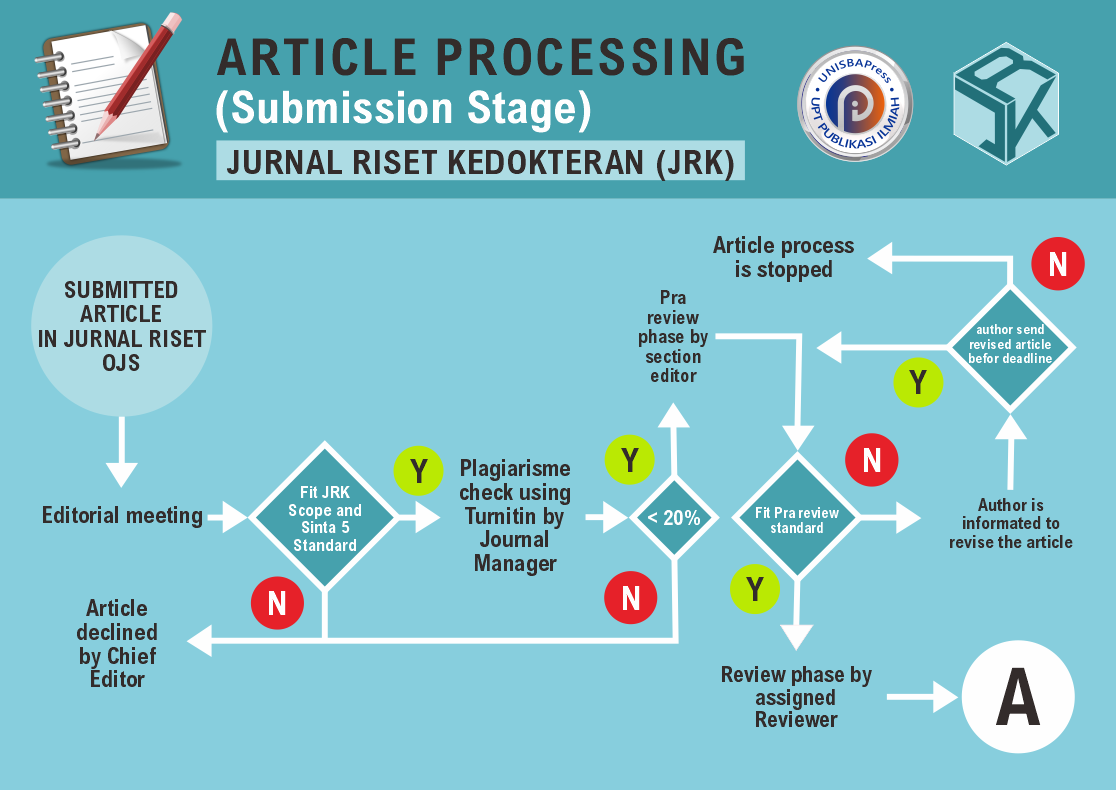A Scoping Review : Hubungan Antara Konsumsi Kopi terhadap Mood pada Orang Dewasa
DOI:
https://doi.org/10.29313/jrk.vi.1464Keywords:
Kafein, Kopi, MoodAbstract
Abstract. Coffee (coffea) is the second most traded commodity product after vegetable oil, and is the most consumed beverage product in the world after water. Coffee consumption is synonymous with an increase in energy, where at present the increase in energy is known as central nervous system (CNS) stimulation. Coffee consumption also affects mood, such as increasing alertness, pleasure, concentration, and relaxation are very important for successful performance, safety and work productivity. Research objective: To determine the relationship between coffee consumption and mood in adults. Research method: scoping review by identifying, analyzing and evaluating a scientific paper according to inclusion and exclusion criteria and screening using eligibility criteria (elegible). Research results: Contains descriptions of research articles that have been reviewed (3 articles) which include eligible criteria, the first article results in coffee being more effective than placebo, the second article results in 1 compound in coffee which gives a less than optimal effect if consumed pure without other compounds in coffee, the third article showed that the higher the caffeine, the more significant the effect on mood. Conclusion: All three articles showed positive results between coffee consumption and mood, however in all three studies, caffeine metabolism in the body of all samples was not measured. While everyone's caffeine metabolism is different and may have different effects, genetic factors must also be considered.
Abstrak. Kopi (coffea) merupakan produk komoditas kedua yang paling banyak diperdagangkan setelah minyak nabati, dan menjadi produk minuman yang paling banyak dikonsumsi di dunia setelah air. Konsumsi kopi identik dengan peningkatan energi, dimana pada masa sekarang peningkatan energi itu dikenal dengan stimulasi sistem saraf pusat (SSP). Konsumsi kopi pun berpengaruh pada mood, seperti meningkatkan kewaspadaan, rasa senang, konsentrasi, dan relaksasi sangat penting untuk keberhasilan kinerja, keamanan dan produktivitas kerja. Tujuan dari penelitian ini untuk mengetahui hubungan antara konsumsi kopi dengan mood pada orang dewasa. Metode a scoping review, dengan bahan penelitian artikel dari jurnal internasional yang memenuhi kriteria inklusi dan eksklusi dan memenuhi kriteria kelayakan (eligible). Artikel ini kemudian diseleksi menggunakan diagram PRISMA dengan mempertimbangkan Population orang dewasa yang berumur diatas 16 tahun, intervention konsumsi kopi, comparison tidak ditentukan, outcome mood, dan study observasional. Didapatkan 3 artikel yang memenuhi kriteria eligible yakni artikel pertama hasilnya kopi lebih efektif dari plasebo, artikel kedua hasilnya 1 senyawa dalam kopi memberikan efek yang kurang maksimal jika dikonsumsi murni tanpa senyawa lain yang ada dalam kopi, artikel ketiga hasilnya semakin tinggi kafein maka pengaruh pada mood semakin signifikan. Kesimpulan: Ketiga artikel menunjukan hasil yang positif antara konsumsi kopi terhadap mood, namun pada ketiga penelitian tersebut, metabolisme kafein pada tubuh dari semua sampel tidak diukur. Di mana metabolisme kafein pada setiap orang berbeda dan mungkin menyebabkan efek yang berbeda pula, faktor genetik juga harus dipertimbangkan.
References
Muhammad Ishak Ilham, Haniarti, and Usman, “Hubungan Pola Konsumsi Kopi Terhadap Kejadian Gastristis Pada Mahasiswa Muhammadiyah Parepare,” J. Ilm. Mns. Dan Kesehat., vol. 2, no. 3, pp. 433–446, 2019, doi: 10.31850/makes.v2i3.189.
I. N. Hasanah, “Pengaruh Substrat Tanam Terhadap Keberhasilan Aklimatisasi Embrio Somatik Kopi Robusta (Coffea Canephora Pierre Ex A. Froehner),” Universitas Muhamadiyah Purwokerto, 2016.
A. Nehlig, “Effects of coffee/caffeine on brain health and disease: What should I tell my patients?,” Pr. Neurol, vol. 16, no. 2, pp. 89–95, 2016, doi: 10.1136/practneurol-2015-001162.
S. N. H. Widodo, B. Kunarto, and E. Y. Sani, “Pengaruh Suhu Dan Lama Waktu Sangrai Terhadap Sifat Fisikokimia Dan Organoleptik Kopi Robusta (Coffea Canephora P) Dari Desa Colo, Kudus,” Universitas Semarang, 2018.
J. Depaula and A. Farah, “Caffeine consumption through coffee: Content in the beverage, metabolism, health benefits and risks,” Beverages, vol. 5, no. 2, 2019, doi: 10.3390/beverages5020037.
A. T. M. E. Haque, N. B. Mohammed Hashim, N. A. Binti Ruslan, and M. Haque, “Lifestyle diseases and their association with coffee consumption at Ipoh, Malaysia,” Res. J. Pharm. Technol., vol. 8, no. 3, pp. 285–291, 2015, doi: 10.5958/0974-360X.2015.00048.7.
E. A. Martin and J. G. Kerns, “The Influence of Positive Mood on Different Aspects of Cognitive Control,” HHS Author Manuscripts2, vol. 25, no. 2, pp. 1–7, 2012, doi: 10.1080/02699931.2010.491652.The.
R. B. Lipton, H. C. Diener, M. S. Robbins, S. Y. Garas, and K. Patel, “Caffeine in the management of patients with headache,” J. Headache Pain, vol. 18, no. 1, 2017, doi: 10.1186/s10194-017-0806-2.
K. K. RI, “Pedoman Pencegahan dan Pengendalian Coronavirus Disease (COVID-19),” 2020. https://covid19.go.id/storage/app/media/Protokol/2020/Juli/REV-05_Pedoman_P2_COVID-19_13_Juli_2020.pdf
T. M. McLellan, J. A. Caldwell, and H. R. Lieberman, “A review of caffeine’s effects on cognitive, physical and occupational performance,” Neurosci. Biobehav. Rev., vol. 71, pp. 294–312, 2016, doi: 10.1016/j.neubiorev.2016.09.001.
C. Willson, “The clinical toxicology of caffeine: A review and case study,” Toxicol. Reports, vol. 5, no. October, pp. 1140–1152, 2018, doi: 10.1016/j.toxrep.2018.11.002.
N. Haworth and S. Hughes, The International Labour Organization. 2012. doi: 10.4337/9781849807692.00014.
M. Singh, “Mood, food and obesity,” Front. Psychol., vol. 5, no. AUG, pp. 1–35, 2014, doi: 10.3389/fpsyg.2014.00925.
E. T. Rolls, “Limbic systems for emotion and for memory, but no single limbic system,” Cortex, vol. 62, pp. 119–157, 2015, doi: https://doi.org/10.1016/j.cortex.2013.12.005.
P. S. Purniti, “Paediatrica Indonesiana,” vol. 51, no. 4, pp. 207–212, 2011, doi: 10.14238/pi.
C. F. Haskell-Ramsay, P. A. Jackson, J. S. Forster, F. L. Dodd, S. L. Bowerbank, and D. O. Kennedy, “The acute effects of caffeinated black coffee on cognition and mood in healthy young and older adults,” Nutrients, vol. 10, no. 10, 2018, doi: 10.3390/nu10101386.
D. A. Camfield, B. Y. Silber, A. B. Scholey, K. Nolidin, A. Goh, and C. Stough, “A randomised placebo-controlled trial to differentiate the acute cognitive and mood effects of chlorogenic acid from decaffeinated coffee,” PLoS One, vol. 8, no. 12, pp. 1–14, 2013, doi: 10.1371/journal.pone.0082897.
C. Irwin, D. McCartney, S. Khalesi, and B. Desbrow, “Caffeine content and perceived sensory characteristics of pod coffee: Effects on mood and cognitive performance,” Curr. Res. Nutr. Food Sci., vol. 6, no. 2, pp. 329–345, 2018, doi: 10.12944/CRNFSJ.6.2.08.













